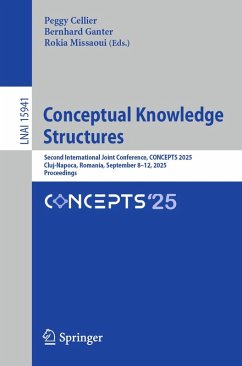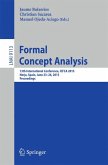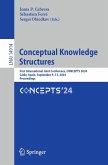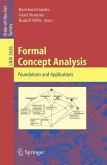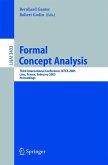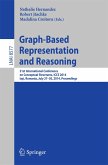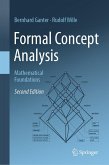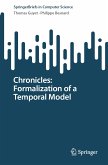Conceptual Knowledge Structures (eBook, PDF)
Second International Joint Conference, CONCEPTS 2025, Cluj-Napoca, Romania, September 8-12, 2025, Proceedings
Redaktion: Cellier, Peggy; Missaoui, Rokia; Ganter, Bernhard
104,95 €
104,95 €
inkl. MwSt.
Sofort per Download lieferbar

52 °P sammeln
104,95 €
Als Download kaufen

104,95 €
inkl. MwSt.
Sofort per Download lieferbar

52 °P sammeln
Jetzt verschenken
Alle Infos zum eBook verschenken
104,95 €
inkl. MwSt.
Sofort per Download lieferbar
Alle Infos zum eBook verschenken

52 °P sammeln
Conceptual Knowledge Structures (eBook, PDF)
Second International Joint Conference, CONCEPTS 2025, Cluj-Napoca, Romania, September 8-12, 2025, Proceedings
Redaktion: Cellier, Peggy; Missaoui, Rokia; Ganter, Bernhard
- Format: PDF
- Merkliste
- Auf die Merkliste
- Bewerten Bewerten
- Teilen
- Produkt teilen
- Produkterinnerung
- Produkterinnerung

Bitte loggen Sie sich zunächst in Ihr Kundenkonto ein oder registrieren Sie sich bei
bücher.de, um das eBook-Abo tolino select nutzen zu können.
Hier können Sie sich einloggen
Hier können Sie sich einloggen
Sie sind bereits eingeloggt. Klicken Sie auf 2. tolino select Abo, um fortzufahren.

Bitte loggen Sie sich zunächst in Ihr Kundenkonto ein oder registrieren Sie sich bei bücher.de, um das eBook-Abo tolino select nutzen zu können.
This book constitutes the refereed proceedings of the Second International Joint Conference on Conceptual Knowledge Structures, CONCEPTS 2025, held in Cluj-Napoca, Romania, during September 8-12, 2025.
The 25 full papers and 2 short papers included in this book were carefully reviewed and selected from 33 submissions. They were organized in topical sections as follows: Methodology; Patterns, Clusters, Visualization and Software; Data Analysis; and Theory.
- Geräte: PC
- ohne Kopierschutz
- eBook Hilfe
- Größe: 33.63MB
Andere Kunden interessierten sich auch für
![Formal Concept Analysis (eBook, PDF) Formal Concept Analysis (eBook, PDF)]() Formal Concept Analysis (eBook, PDF)40,95 €
Formal Concept Analysis (eBook, PDF)40,95 €![Conceptual Knowledge Structures (eBook, PDF) Conceptual Knowledge Structures (eBook, PDF)]() Conceptual Knowledge Structures (eBook, PDF)120,95 €
Conceptual Knowledge Structures (eBook, PDF)120,95 €![Formal Concept Analysis (eBook, PDF) Formal Concept Analysis (eBook, PDF)]() Formal Concept Analysis (eBook, PDF)64,95 €
Formal Concept Analysis (eBook, PDF)64,95 €![Formal Concept Analysis (eBook, PDF) Formal Concept Analysis (eBook, PDF)]() Formal Concept Analysis (eBook, PDF)40,95 €
Formal Concept Analysis (eBook, PDF)40,95 €![Graph-Based Representation and Reasoning (eBook, PDF) Graph-Based Representation and Reasoning (eBook, PDF)]() Graph-Based Representation and Reasoning (eBook, PDF)40,95 €
Graph-Based Representation and Reasoning (eBook, PDF)40,95 €![Formal Concept Analysis (eBook, PDF) Formal Concept Analysis (eBook, PDF)]() Bernhard GanterFormal Concept Analysis (eBook, PDF)36,95 €
Bernhard GanterFormal Concept Analysis (eBook, PDF)36,95 €![Chronicles: Formalization of a Temporal Model (eBook, PDF) Chronicles: Formalization of a Temporal Model (eBook, PDF)]() Thomas GuyetChronicles: Formalization of a Temporal Model (eBook, PDF)40,95 €
Thomas GuyetChronicles: Formalization of a Temporal Model (eBook, PDF)40,95 €-
-
-
This book constitutes the refereed proceedings of the Second International Joint Conference on Conceptual Knowledge Structures, CONCEPTS 2025, held in Cluj-Napoca, Romania, during September 8-12, 2025.
The 25 full papers and 2 short papers included in this book were carefully reviewed and selected from 33 submissions. They were organized in topical sections as follows: Methodology; Patterns, Clusters, Visualization and Software; Data Analysis; and Theory.
The 25 full papers and 2 short papers included in this book were carefully reviewed and selected from 33 submissions. They were organized in topical sections as follows: Methodology; Patterns, Clusters, Visualization and Software; Data Analysis; and Theory.
Dieser Download kann aus rechtlichen Gründen nur mit Rechnungsadresse in A, B, BG, CY, CZ, D, DK, EW, E, FIN, F, GR, HR, H, IRL, I, LT, L, LR, M, NL, PL, P, R, S, SLO, SK ausgeliefert werden.
Produktdetails
- Produktdetails
- Verlag: Springer International Publishing
- Seitenzahl: 438
- Erscheinungstermin: 5. September 2025
- Englisch
- ISBN-13: 9783032033642
- Artikelnr.: 75386683
- Verlag: Springer International Publishing
- Seitenzahl: 438
- Erscheinungstermin: 5. September 2025
- Englisch
- ISBN-13: 9783032033642
- Artikelnr.: 75386683
- Herstellerkennzeichnung Die Herstellerinformationen sind derzeit nicht verfügbar.
.- Methodology.
.- Conceptual Topic Aggregation.
.- The Geometric Structure of Topic Models
.- Relational Concept Analysis and Graph-FCA in Practice: Analyzing Multirelational Data.
.- Reduced Subcontext Completion in Lattices and Concept Lattices.
.- Limitations of attribute derivations for approximating user-based attribute weighting.
.- Moregraph: Metadata-driven Enterprise Architecture using Conceptual Structures.
.- LLM-Assisted Concept Analysis for Class Model Restructuring.
.- Empowering Relational Concept Analysis using Large Language Model knowledge delivery.
.- Patterns, Clusters, Visualization and Software.
.- Towards Explainable Clustering in Process Mining and Sequential Pattern Mining: A Formal Framework.
.- A Proposal for Building a Compact and Tunable Representation of a Concept Lattice Based on Clustering.
.- Atomic Patterns for Efficient Computation with Pattern Structures.
.- Layout Decisions for Tabular Euler Diagrams.
.- Spanning Concept Trees: Enhanced Algorithm and Visualisation.
.- Closure versus Dualization: A Comparison of Software Tools for Formal Concept Analysis.
.- Data Analysis.
.- Comparative analysis of COVID-19 vaccines applied in Mexico through FCA.
.- Metatheoretic Structuralism Meets Formal Concept Analysis.
.- Qualitative and Quantitative Analyses of C. elegans Perception with Concept Lattices as Information Channels.
.- Image processing in Boolean matrix factorization.
.- On distance functions between closure systems and their application in industrial maps.
.- Theory.
.- When Horn is All You Need.
.- Rational Inference in Formal Concept Analysis.
.- Incomplete Formal Contexts and their Intrinsic Dimension.
.- The E-base of finite semidistributive lattices.
.- A Data Model for Relational Concept Algebras.
.- Rises for Measuring Local Distributivity in Lattices.
.- A Stone duality for pure and trivial double Boolean algebras.
.- Concept multilattices with truth-stressing hedges.
.- Conceptual Topic Aggregation.
.- The Geometric Structure of Topic Models
.- Relational Concept Analysis and Graph-FCA in Practice: Analyzing Multirelational Data.
.- Reduced Subcontext Completion in Lattices and Concept Lattices.
.- Limitations of attribute derivations for approximating user-based attribute weighting.
.- Moregraph: Metadata-driven Enterprise Architecture using Conceptual Structures.
.- LLM-Assisted Concept Analysis for Class Model Restructuring.
.- Empowering Relational Concept Analysis using Large Language Model knowledge delivery.
.- Patterns, Clusters, Visualization and Software.
.- Towards Explainable Clustering in Process Mining and Sequential Pattern Mining: A Formal Framework.
.- A Proposal for Building a Compact and Tunable Representation of a Concept Lattice Based on Clustering.
.- Atomic Patterns for Efficient Computation with Pattern Structures.
.- Layout Decisions for Tabular Euler Diagrams.
.- Spanning Concept Trees: Enhanced Algorithm and Visualisation.
.- Closure versus Dualization: A Comparison of Software Tools for Formal Concept Analysis.
.- Data Analysis.
.- Comparative analysis of COVID-19 vaccines applied in Mexico through FCA.
.- Metatheoretic Structuralism Meets Formal Concept Analysis.
.- Qualitative and Quantitative Analyses of C. elegans Perception with Concept Lattices as Information Channels.
.- Image processing in Boolean matrix factorization.
.- On distance functions between closure systems and their application in industrial maps.
.- Theory.
.- When Horn is All You Need.
.- Rational Inference in Formal Concept Analysis.
.- Incomplete Formal Contexts and their Intrinsic Dimension.
.- The E-base of finite semidistributive lattices.
.- A Data Model for Relational Concept Algebras.
.- Rises for Measuring Local Distributivity in Lattices.
.- A Stone duality for pure and trivial double Boolean algebras.
.- Concept multilattices with truth-stressing hedges.
.- Methodology.
.- Conceptual Topic Aggregation.
.- The Geometric Structure of Topic Models
.- Relational Concept Analysis and Graph-FCA in Practice: Analyzing Multirelational Data.
.- Reduced Subcontext Completion in Lattices and Concept Lattices.
.- Limitations of attribute derivations for approximating user-based attribute weighting.
.- Moregraph: Metadata-driven Enterprise Architecture using Conceptual Structures.
.- LLM-Assisted Concept Analysis for Class Model Restructuring.
.- Empowering Relational Concept Analysis using Large Language Model knowledge delivery.
.- Patterns, Clusters, Visualization and Software.
.- Towards Explainable Clustering in Process Mining and Sequential Pattern Mining: A Formal Framework.
.- A Proposal for Building a Compact and Tunable Representation of a Concept Lattice Based on Clustering.
.- Atomic Patterns for Efficient Computation with Pattern Structures.
.- Layout Decisions for Tabular Euler Diagrams.
.- Spanning Concept Trees: Enhanced Algorithm and Visualisation.
.- Closure versus Dualization: A Comparison of Software Tools for Formal Concept Analysis.
.- Data Analysis.
.- Comparative analysis of COVID-19 vaccines applied in Mexico through FCA.
.- Metatheoretic Structuralism Meets Formal Concept Analysis.
.- Qualitative and Quantitative Analyses of C. elegans Perception with Concept Lattices as Information Channels.
.- Image processing in Boolean matrix factorization.
.- On distance functions between closure systems and their application in industrial maps.
.- Theory.
.- When Horn is All You Need.
.- Rational Inference in Formal Concept Analysis.
.- Incomplete Formal Contexts and their Intrinsic Dimension.
.- The E-base of finite semidistributive lattices.
.- A Data Model for Relational Concept Algebras.
.- Rises for Measuring Local Distributivity in Lattices.
.- A Stone duality for pure and trivial double Boolean algebras.
.- Concept multilattices with truth-stressing hedges.
.- Conceptual Topic Aggregation.
.- The Geometric Structure of Topic Models
.- Relational Concept Analysis and Graph-FCA in Practice: Analyzing Multirelational Data.
.- Reduced Subcontext Completion in Lattices and Concept Lattices.
.- Limitations of attribute derivations for approximating user-based attribute weighting.
.- Moregraph: Metadata-driven Enterprise Architecture using Conceptual Structures.
.- LLM-Assisted Concept Analysis for Class Model Restructuring.
.- Empowering Relational Concept Analysis using Large Language Model knowledge delivery.
.- Patterns, Clusters, Visualization and Software.
.- Towards Explainable Clustering in Process Mining and Sequential Pattern Mining: A Formal Framework.
.- A Proposal for Building a Compact and Tunable Representation of a Concept Lattice Based on Clustering.
.- Atomic Patterns for Efficient Computation with Pattern Structures.
.- Layout Decisions for Tabular Euler Diagrams.
.- Spanning Concept Trees: Enhanced Algorithm and Visualisation.
.- Closure versus Dualization: A Comparison of Software Tools for Formal Concept Analysis.
.- Data Analysis.
.- Comparative analysis of COVID-19 vaccines applied in Mexico through FCA.
.- Metatheoretic Structuralism Meets Formal Concept Analysis.
.- Qualitative and Quantitative Analyses of C. elegans Perception with Concept Lattices as Information Channels.
.- Image processing in Boolean matrix factorization.
.- On distance functions between closure systems and their application in industrial maps.
.- Theory.
.- When Horn is All You Need.
.- Rational Inference in Formal Concept Analysis.
.- Incomplete Formal Contexts and their Intrinsic Dimension.
.- The E-base of finite semidistributive lattices.
.- A Data Model for Relational Concept Algebras.
.- Rises for Measuring Local Distributivity in Lattices.
.- A Stone duality for pure and trivial double Boolean algebras.
.- Concept multilattices with truth-stressing hedges.
